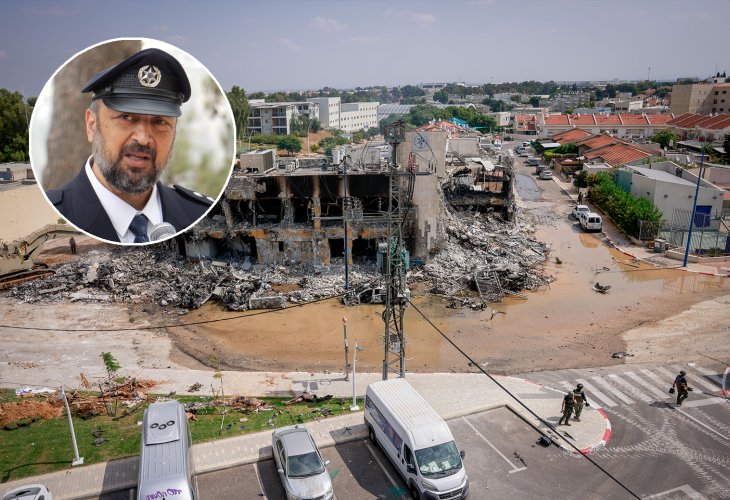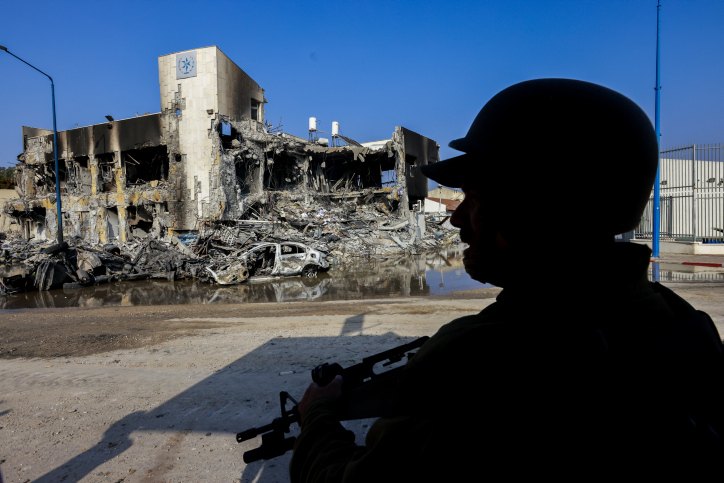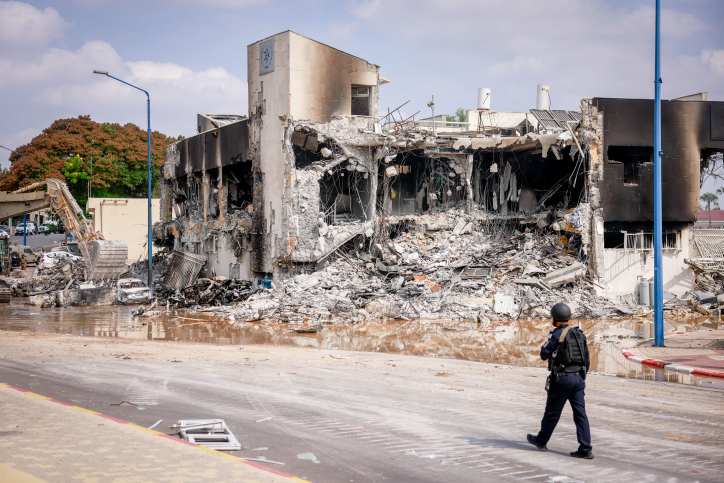A Rabbi's Reflections from the Heart of the Conflict
Identifying the fallen, lifting morale, and facing difficult decisions: Israel's police chief rabbi shares wartime insights.
 In circle: Rabbi Bar-Chaya (Photo: Israel Police Spokesperson, Background Photo: Chaim Goldberg / Flash 90)
In circle: Rabbi Bar-Chaya (Photo: Israel Police Spokesperson, Background Photo: Chaim Goldberg / Flash 90)In a special interview with Hidabroot, Israel's chief rabbi for the police, Commander Rami Rahamim Bar-Chaya, recounts the events of recent weeks from the outbreak of 'Operation Iron Swords' on Simchat Torah to the present day.
Can you take us back to the morning of Simchat Torah? Where were you when the attack began?
"I was praying the early morning service. Around 6:30, I heard 'booms,'" Rabbi Bar-Chaya recalls. "I thought it might be rain, just some thunder. Sometimes there's a storm east of Binyamin, so I figured it was that. But then the phone was buzzing endlessly at home, and I realized something was off. When I picked it up, I found out Hamas had declared war and I had decisions to make. I was informed of killed officers, and asked where to transfer them."
We didn't yet grasp the magnitude...
"While they told me it was more than just one event and that there were multiple fallen officers, we weren't aware of the full numbers. As the police's rabbinic authority, I had to decide what to do.
"They asked whether to direct the bodies to Abu Kabir or Shura Camp. I decided on Shura," describes Rabbi Bar-Chaya, acknowledging the significance of this decision. "Given the large number of officers, I realized taking them to Abu Kabir might create bottlenecks. Shura is bigger and can handle such a large event."
"Later on Shabbat, the military rabbinate called, asking whether the bodies should be placed with civilians or soldiers. I replied, 'with the soldiers.' It turned out to be crucial as this decision allowed us to hold 58 funerals within two weeks."
'Grateful' We Found a Commander
Rabbi Bar-Chaya continues to recount how events unfolded post-Shabbat: "We rushed to Shura. We formed a team of rabbis to locate our officers. We knew there were dozens, not yet the full 58, but it was a daunting number even then. We began searching through body bags for the officers."
Upon hearing the news, how did you react?
"Stunned, shocked," Rabbi Bar-Chaya responds. "We never thought police officers would be fighting terrorists. That's the army's job. Then we hear of officers fighting in Ofakim and Sderot, and fallen YAMAM fighters. This unit is prestigious, known worldwide as nearly invincible. Suddenly, we have losses from YAMAM and other police units, an unprecedented and startling event."
 (Photo: Yossi Zamir / Flash 90)
(Photo: Yossi Zamir / Flash 90)What decisions do you make to maintain police morale?
"Firstly, identifying the officers was crucial to hold funerals. Our goal was to ensure every fallen officer was identified with absolute certainty. This work was sacred, ensuring families knew their loved one was properly laid to rest in a Jewish cemetery."
The Torah that Empowers Fighters
What did you do after identifying the fallen?
"Two main things: police morale and reestablishing the Sderot station. When the Torah scroll at the station was burned, I decided to host a burial ceremony and bring a new scroll to Sderot. When we brought the Torah to the new station, officers embraced it and wept. I realized then how deeply connected they are to the Torah, how it gives them strength in combat. Their emotional response underscored the importance of our rabbinical role."
 (Photo: Chaim Goldberg / Flash 90)
(Photo: Chaim Goldberg / Flash 90)"We also began conducting the 58 funerals over two weeks, facing many difficult halachic questions, like temporary burial or delaying ceremonies for unit members to attend. We dealt with everything in real-time."
"In the war's first week, police shifted to combat mode. Questions regarding Shabbat began to arise, not just from officers, but from community rabbis too. They asked how to organize on Shabbat to prevent confrontations. The situation was tense both in Judea and Samaria and in mixed cities; no one knew where it was heading, so rabbis sought our guidance."
"The questions varied," shares the rabbi, "should security vehicles operate with lights on Shabbat, should those with weapons patrol the cities? We consulted leading rabbis, including Rabbi Zilberstein, Rabbi Yitzhak Yosef, and Rabbi Asher Weiss, who provided detailed guidance."
"Additionally, there was the pressing question of continuing identification work on Shabbat. Families anxiously await confirmation, and delaying might spark national protests. We concluded it was necessary to work on Shabbat, though funerals were not conducted, to address families' pressing concerns."
How do you support officers in the field, particularly those at checkpoints?
"I visited every unit in the south that was accessible. We offered words of encouragement, forming circles and singing together. It gave them strength. Tension wasn't limited to the south; we visited units elsewhere. Even those not typically on operational fronts played special roles in the conflict."
"You hear heroic stories," Rabbi Bar-Chaya shares. "Unprecedented events. I suggested recording these stories."
Honoring a Fallen Commander
What's a moment from the first month of conflict you'll never forget?
"We were searching for two station commanders among the soldiers at Shura Camp. Once we found one, I felt compelled to salute him. I knew him well and felt it was necessary. Despite the overwhelming emotions and circumstances, I stood and saluted. It was... anyone watching might think I was unbalanced, but it was something I needed to do," shares the rabbi, his voice thick with emotion.
Where do you find the strength for all this?
"Two sources," replies the rabbi. "Everywhere you go, you see people eager to help. Religious Jews offer support in every possible way. Realizing we aren't alone, with a nation standing strong, is empowering.
"Additionally, our faith sustains us. We are part of a significant heritage, with a great message for the world. I am a firm believer in our people and traditions, the gifts bestowed upon us by Hashem and our Torah. Knowing we are Jews, standing proud against the chaos—it gives us strength."
What's your message during this time?
"Unity is essential. It shouldn't only show in wartime. We are one spiritual entity. 'Love your neighbor' is a fundamental principle. We must express unity daily—at work, with neighbors, everywhere.
"Rabbi Amar recounted to southern district officers how Rabbi Chaim Shmuelevitz learned of a woman forgiving her husband after 17 years during the Six-Day War. She asked Hashem to forgive Israel just as she forgave her husband. Such acts move Hashem to redemption. We have a great mission as the people of Israel to strengthen; it empowers us on the battlefield," concludes Rabbi Bar-Chaya.
Participate in support activities for soldiers and evacuees, and in writing a Torah scroll for the protection and safety of soldiers and hostages.
Receive a special Chanukah menorah at home by Chanukah. Call now: 073-222-1212

